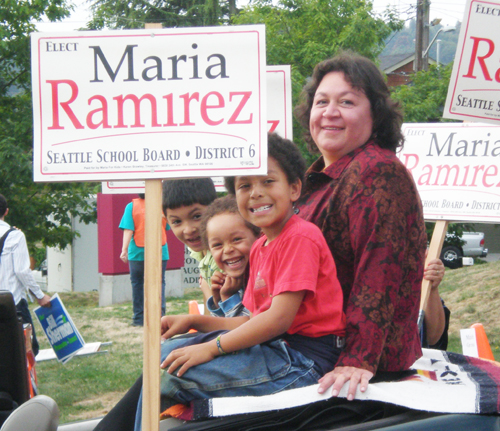
Maria Ramirez at the highlight of her campaign for Seattle School Board director with students (from left to right) Michael Hernandez, Cameron Jenkins, and Sean Jenkins (Photo provided by Maria Ramirez)
By Maria Ramirez
For Northwest Asian Weekly
Two years ago, I was running for office.
Even though two years have passed, I am still asked what it was like to run. I usually say, “It was a great experience. I may not have gotten the votes I needed, but I earned my Ph.D. trying!” A Ph.D. from the school of hard knocks, that is. Were it not for the lack of votes, I would have graduated magna cum laude.
I ran to serve on the Seattle School Board. The school board director position is very unique from other elected positions. There is very little pay for this position (about $5,000 per year). The position is non-partisan, yet political endorsements are highly valued and sought after by most candidates. Some school board members are retired, independently wealthy, or work full-time jobs in addition to serving on the board.
It’s also one of the most illusive positions for voters to be informed about. The school board director is a low-profile race, yet the impact of this position may be as great as that of a city council member or a mayor.
Most of the credits for my Ph.D. were earned in data analysis, political science, finance, marketing, anthropology, psychology, and public speaking. As a Ph.D. candidate, I had to state my case time and again. I had to assert my vision for my community. I had a volunteer campaign manager, an adviser, and a few mentors who helped guide my work.
The most important lesson I learned on the campaign trail was that in order to be considered a viable candidate, you must either be good at raising money or you must have money of your own to start with.
As a single mother, I had no money to start with. Fundraising was my least favorite part of my campaign. I ended up taking on a lot of debt of my own. To raise funds, you must commit to spending hours on the phone, dialing for dollars.
Imagine calling folks you’ve never met or haven’t seen in years, asking them to give you money to pay for mailings and campaign expenses. Remember, this is a city-wide race. After the primary, I did one mailing before the general election. I reached less than 10,000 voters and spent about $11,000. Please support publicly funded campaign legislation.
But I’m jumping ahead. You can’t have campaign material until you have your message. What message can you talk about for five months? Do you say you’re in support of change? Do you inspire folks to sing “Kumbaya”? Do you come out against something or come out for something?
This brings us to the most important strand of my studies: marketing. The countless questionnaires, interviews, schmoozing, and time spent on the blogs to get out my message. A candidate must have perfect behavior. If I saw a candy wrapper on the street, I felt like I had to run and pick it up, or I’d run the risk of being called a litterer.
Don’t have more than one glass of wine around people, if any! Your breath and makeup must be fresh. You learn to work a room, making your way to every table, shaking every hand you can, asking them for their vote and a donation.
Along the way, you pick up endorsements. This is where you learn to value your endorsements like gold.
The next lesson would be how I learned to interpret voting trends to guide my decisions on which voters to spend my time talking to.
I learned about those who vote and those who don’t. There are differences between north end and south end voting patterns. I learned to understand the role and leadership (and membership) of the five Democratic Legislative districts in Seattle. I learned the value of being a PCO (precinct committee chair) and the importance of being involved in my district.
I started my advocacy work in the African American community guided by my mentor, Edith Giles. I went on to understand the challenges of the Asian communities, and those of the South Pacific Islanders. In the most recent years, my attention turned to advocacy for immigrant and refugee families.
I learned a bit about second language acquisition, blended models, and scaffolding. You see, education has its own set of vocabulary that can easily create a barrier for parent engagement. My focus since my campaign has been an intense study of family engagement models.
About one year after my campaign ended, Padres Promotores de Campaña Quetzal was funded by the City of Seattle. I am now the executive director of Campaña Quetzal and have the good fortune to work with a brilliant group of professionals who serve Latino families in Seattle. It is my dream to work with the leadership in other communities to replicate this model beyond the Latino community.
In the end, I worked intensely for more than five months on my campaign. I never took a day off. Running for office was exciting and scary as all get out.
I am glad for the education I received on the campaign trail. The lessons I learned have helped me advance my work in advocating for children. As you see, I didn’t lose! ♦
For more information about Padres Promotores de Campaña Quetzal, visit campanaquetzal.org.
Maria Ramirez can be reached at info@nwasianweekly.com.



